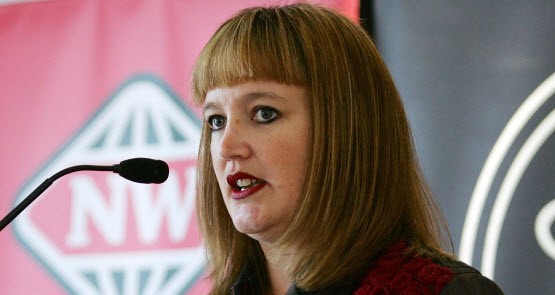
The Canterbury Bulldogs NRL club has named New Zealand Netball chief executive Raelene Castle to the CEO role vacated by Todd Greenberg last month. It’s a good move — and not just because she’s the first female to lead a professional footy club in Australia.
Castle is relatively unknown in Australia outside of the circles of netball. She became CEO of NZ Netball at almost the same time that I was appointed to the board of Netball Australia in mid-2007. The following year Netball Australia and Netball New Zealand joined forces to launch the trans-Tasman ANZ Championship.
During her six-year tenure, which will officially end with this announcement (coincidentally, my netball tenure also ended this month), I found Castle to be the most formidable of opponents. Not only has she driven the national team, the Silver Ferns, to great success, including winning the highly prized 2010 Commonwealth Games gold medal, which got the whole of Australia talking about netball, but she was instrumental in securing the major broadcast deal with SKY in New Zealand.
Last September I travelled to Auckland for a Netball Australia board meeting. The following day our board and CEO Kate Palmer met with Raelene and her board to discuss the future of the sport and our role as world leaders in its progression. The leadership skills of the two CEOs were on display that morning, and as I sat there listening to them outline the key issues I found myself reflecting on how lucky the sport of netball was to have such strong, strategic leaders delivering positive outcomes for our two sporting nations.
Palmer worked closely with Castle to deliver the ANZ Championship and Constellation Cup for their respective countries. More often than not, their teams were head-to-head in the final game of an international netball event. Palmer describes Castle as “a tough, tenacious, ambitious and fair person who has wonderful personal skills, very strong networks and good business skills”. Palmer says Castle is passionate about all sports and has been known to stay up all night to watch a good game. It’s clear the CEO of Netball Australia will miss sparring with her most competitive partner.
The Bulldogs’ gain will be a loss for Netball NZ, but Castle has built a quality team with a strong culture of performance and community. The Netball NZ board led by Raewyn Lovett will undoubtedly have thought about succession planning after six solid years.
There are currently only 19 women in senior management or board positions at NRL clubs. The Australian Rugby League Commission has one female director, Harris Farm’s Catherine Harris. Every female appointment at leadership level is a welcome development for a sport that has experienced its share of scandal over the treatment of women by some players in recent years. The appointment of a woman to the helm of one of the more controversial clubs off the field should send a positive signal to the entire rugby league community.
This is an exciting development for women who aspire to leadership levels of male sports, historically off-limits to women. It was only five years ago that an advertisement for a vacant directorship of at least one NRL club listed as a key requirement: “Must have played the sport.” That detail is burned in my mind because I was keen to apply when I spotted it, but was rendered ineligible before getting anywhere near the starting line-up due to gender.
Clearly leadership of the Canterbury Bulldogs does not carry that requirement. A track record of leading a national sporting organisation to victory, coupled with business acumen, regardless of gender, is the criteria of the day.
My first-hand knowledge of what Castle did for Netball NZ and the sport of netball in general provides me with the confidence to predict great change, growth and success for the Bulldogs. If she succeeds in making that impact the knock-on effect in creating opportunities for women at the top of sports organisations should be compelling. All it takes is one trailblazer to show the way. I spy a big crack forming in the glass ceiling of professional sports codes.
* This article was first published at Women’s Agenda







Actually, Brisbane Roar had a female CEO first – Eugene Buckley.
As did the Adelaide Rams with Liz Dawson.
Not being a rugby league follower I had to look up who “The Bulldogs” are, in this context. Apparently it is Canterbury-Bankstown. Whatever happened to the old names based on the suburb or region they call home? It made much more sense to me.
Any right thinking person knows that The Bulldogs means South Fremantle. That Victoriam mob who call themselves The Western Bulldogs should know that South Fremantle is a lot further west. And we have this mob in Sydney as well. Perhaps they should call themselves The Eastern Bulldogs. It is all very confusing.
Donna Burke Cronulla 1988-89.
Shows just how few.